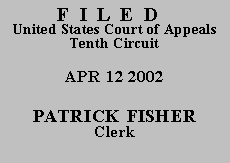

| JAMES BYRON WAECKERLE,
v.
STATE OF OKLAHOMA; |
|
Before BARRETT, PORFILIO, and
BRORBY, Senior Circuit Judges.
After examining the briefs and appellate record, this panel has determined
unanimously that oral argument would not materially assist the determination of
this appeal. See Fed. R. App. P. 34(a)(2); 10th Cir. R. 34.1(G). The case is
therefore ordered submitted without oral argument.
James Byron Waeckerle, a state prisoner appearing pro se, appeals a district court order dismissing his 42 U.S.C. § 1983 action. Our jurisdiction arises pursuant to 28 U.S.C. § 1291. After careful consideration, we affirm.
Mr. Waeckerle is currently incarcerated for workers' compensation fraud and obtaining money by false pretenses. In this § 1983 action Mr. Waeckerle alleges Stacy M. Mahone, an Oklahoma parole officer, conducted a flawed presentence investigation which "show[ed] willful indifference to [Mr. Waeckerle's] Constitutional rights." Officer Mahone's presentence investigation report incorrectly identified a prior misdemeanor check fraud conviction as a felony. At the sentencing judge's request, Officer Mahone promptly filed an amended presentence investigation report correcting the mistake. Although Mr. Waeckerle concedes the mistake did not affect the sentencing judge's decision, he believes Clinton Lewis, a parol investigator, later recommended against granting parole because of the error. Thus, Mr. Waeckerle contends the presentence investigation error caused his incarceration to extended "for a longer period of time than was contemplated" by the sentencing judge. Mr. Waeckerle, a sixty-five-year old white insurance professional, also generally alleges racial discrimination. Mr. Waeckerle seeks $1,150,000.00 in compensation for his allegedly unjust confinement.
The district court dismissed Mr. Waeckerle's action without prejudice for failure to state a claim upon which relief could be granted under Rule 12(b)(6). In a well reasoned order, the district court explained Mr. Waeckerle's arguments "necessarily imply the invalidity of his conviction, sentence, or parole determination," and therefore his "exclusive remedy is habeas corpus."
Mr. Waeckerle now argues the district court erred in dismissing his § 1983 action. We review de novo a district court's dismissal pursuant to Rule 12(b)(6). Durre v. Dempsey, 869 F.2d 543, 545 (10th Cir. 1989). "Dismissal under Rule 12(b)(6) is appropriate only if plaintiff can prove no set of facts in support of his claim which would entitle plaintiff to relief." Id. Moreover, "[i]n reviewing the district court's dismissal, we accept as true plaintiff's allegations, which will be construed in the light most favorable to the plaintiff." Id. Because Mr. Waeckerle proceeds pro se, we liberally construe his pleadings. Haines v. Kerner, 404 U.S. 519, 520 (1972).
The Supreme Court has held "habeas corpus is the exclusive remedy for a state prisoner who challenges the fact or duration of his confinement and seeks immediate or speedier release, even though such a claim may come within the literal terms of § 1983." Heck v. Humphrey, 512 U.S. 477, 481 (1994). When a state prisoner seeks damages under § 1983, we "must consider whether a judgment in favor of the plaintiff would necessarily imply the invalidity of [the prisoner's] conviction or sentence; if it would, the complaint must be dismissed unless the plaintiff can demonstrate that the conviction or sentence has already been invalidated." Id. at 487. Moreover, Heck "applies to proceedings that call into question the fact or duration of parole or probation." Crow v. Penry, 102 F.3d 1086, 1087 (10th Cir. 1996). See also Schafer v. Moore, 46 F.3d 43, 44-45 (8th Cir. 1995) (holding Heck requirement applies to § 1983 actions challenging denial of parole).
Mr. Waeckerle's § 1983 claim necessarily implies the invalidity of his parole denial. He alleges Parol Investigator Clinton unjustly recommended denying parole based on errors within the presentence investigation report and racial discrimination. Thus, Mr. Waeckerle's "civil claim for damages amounts to a collateral attack on his parole [denial] and subsequent incarceration." Crow, 102 F.3d at 1087. Because Heck does not allow Mr. Waeckerle's § 1983 suit to proceed, his sole recourse is through habeas corpus. The district court correctly dismissed the action since Mr. Waeckerle has not demonstrated his conviction or sentence has already been invalidated. Therefore we AFFIRM the district court's order dismissing Mr. Waeckerle's action.
We remind Mr. Waeckerle he must exhaust available state remedies before raising a habeas corpus claim in federal court. We also remind Mr. Waeckerle he is responsible to continue making partial payments until the entire balance of the appellate filing fee is paid.
Entered by the Court:
WADE BRORBY
United States Circuit Judge
*. This order and judgment is not binding precedent except under the doctrines of law of the case, res judicata and collateral estoppel. The court generally disfavors the citation of orders and judgments; nevertheless, an order and judgment may be cited under the terms and conditions of 10th Cir. R. 36.3.